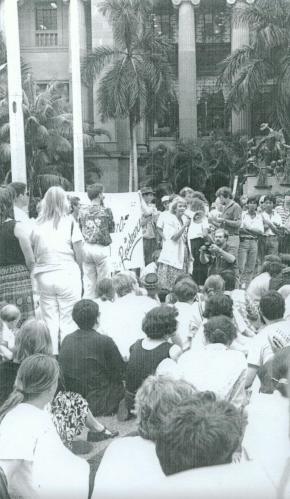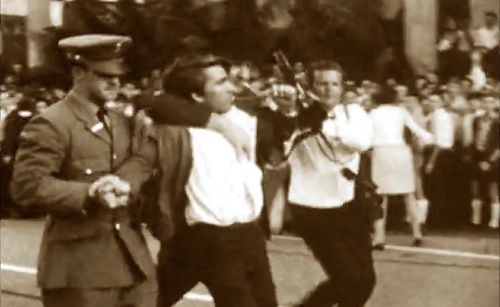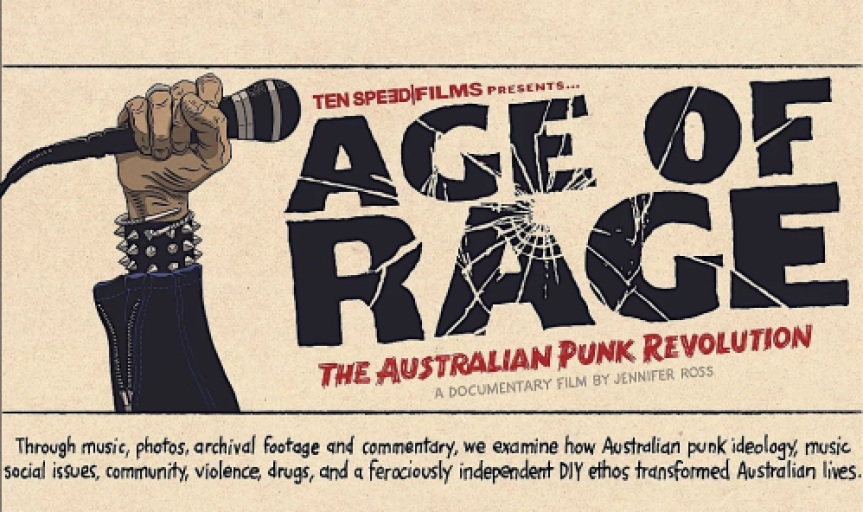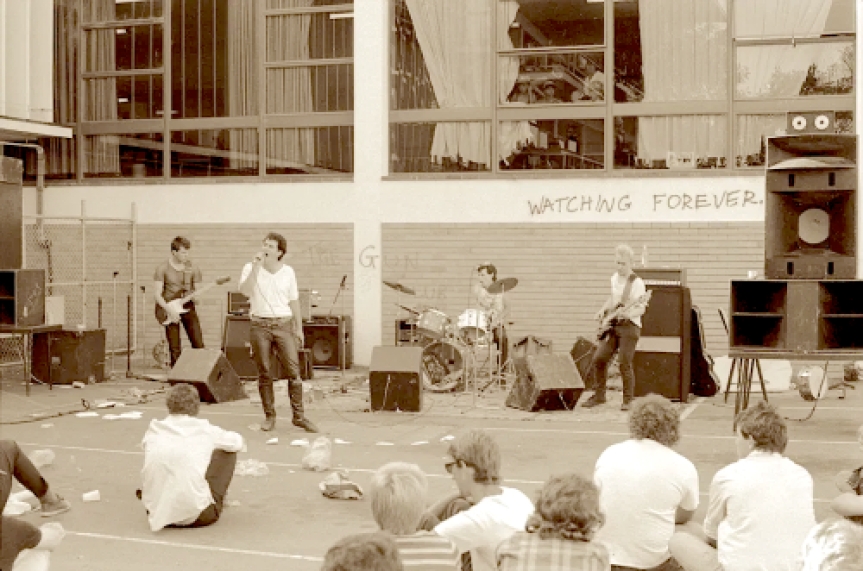'The future is unforgiving, you make choices now
that create things later...'
- Warwick Thornton,
filmmaker and artist,
Sampson and Delilah

ASSANGE, MANNING AND SNOWDEN, modern riders of the apocalypse, could not have predicted how bad it would get in Iraq, in Syria and neighbouring countries.
Their stock in trade, US intelligence, could not say.
Political decisions made were subconscious of the end game. Better no decisions at all than what was done in the name of getting rid of Saddam Hussein and WMDs that did not exist (sic).
The ‘coalition of the willing’ of which Australia was a part unleashed the kind of fear and loathing that Nixon could only dream of in Cambodia. The genocide of Pol Pot was its consequence.
A carousel of hate began to reverse the Sykes-Picot agreement that carved up the Ottoman Empire and the Arabian Gulf 100 years before. Islamic State in Iraq and Syria (ISIS) has erased that agreement by forming a caliphate across borders created by French and British governments in 1916. T E Lawrence would turn in his grave.
Waves of refugees are changing families, village, land and country.
Anti-war movements
On the surface, problems for the peace movement began with the failure of the 2003 mobilisation against the Iraq War. In truth it began long before that.
In Brisbane over 100,000 people turned up at the Botanic Gardens to oppose Australia’s involvement. Over a million people marched Australia-wide. The Australian Government went to war regardless, albeit with a cautious deployment of troops, ships and warplanes. Democracy had failed.
It is generally recognised now that Shock & Awe (a re-run of Desert Storm in 1991) and what followed was an unmitigated disaster. Millions dead and war throughout the region. A generation of Iraqi babies deformed from exposure to depleted uranium. One deployment of troops and airstrikes after another.

This week ends the Talisman Sabre war games with US and a handful of Japanese military in Shoalwater Bay in central Queensland. People who attended the Independent & Peaceful Australia Network (IPAN) forum titled Dangerous Allies during the Talisman Sabre exercises claimed that the peace movement is on the rise again. At the IPAN forum there were keynote speakers from Japan (Professor Kozue Akibayashi), the Greens (Senator Scott Ludlum) and academia (Richard Tanter). With 10% of the national vote, the Greens are almost mainstream. The speakers even showed their solidarity with activists by going to the war games in Rockhampton to voice their concerns about the US alliance.

Before they went, we all attended a one day workshop at Trades Hall in Brisbane where union representation was noticeably absent. The other absence was socialist groups. There were only a couple of retired union officials present, one who used to be the secretary of the Bus section of the Rail Bus & Tram union (David Matters), and the other from the now defunct Trades hall in Adelaide (Chris White). Trades Hall in Brisbane like others, or more correctly like those that still survive, is itself lacking in unions. Only one small union, the Australian Media & Entertainment Arts Alliance (AMEAA) choosing to be remain there. Since amalgamations brought upon them by the Accord, other unions are big enough to have their own buildings.
Numbers at IPAN (about 80) were good nonetheless and a range of participants joined in and a good atmosphere prevailed throughout the day. I was slightly put off by the homage paid to deceased Prime Minister Malcolm Fraser by several speakers. Fraser was Minister of the Army when 19 year old boys were called up to go to another pointless war in Vietnam in the late 1960s. Memories are either short, forgiving or both.

Which brings me to this reflection. The current Australian peace movement has it roots in opposition to the fateful decision of the Hawke Labor government to send frigates to the 1991 Gulf War as part of the US alliance. By that time the Vietnam war (1963-1975) was a distant reality for many peace activists. And the Gulf War of 1991 ended before the peace movement could get started, or at least that is what we were told, the war continues to this day, albeit in a different form.
I do remember a particular day in February, 1991 when we marched (in thousands) to Albert Park to protest against the Gulf War after Saddam Hussein invaded Kuwait. The march was led by Cheryl Kernot, who became leader of the Australian Democrats in 1993 and later, after switching parties, shadow minister in the Labor opposition in 1998. The march was not as big as in 2003 but it was sizeable, considering the nature of Australian involvement and that there was a Labor government at both state and federal levels. It was organised by a quickly assembled Anti-Gulf War coalition which comprised of activists from the Democratic Socialist Party, its youth wing (Resistance), International Socialist Organisation (ISO), Catholic Worker, Committee in Solidarity with Latin America and the Caribbean, the Communist Party and some independents. Were the groups any different in opposition to World War I?
Age of Rage

I’m riding on a midnight train & everybody looks just the same a subway light it’s dirty reflection I’m lost I don’t have a direction I’m stranded … Livin’ in a world insane – The Saints
As it turned out, Albert Park was across the road from the US consul’s office (on Wickham Terrace). Anyway some punks (stranded in a time warp from the late 1970s) started acting up and shouting ‘pigs’ at the coppers in attendance and predictably police started arresting punks willy nilly with some real violence of their own.
In the melee, people streamed from Albert Park to see what the fuss was all about.
Beforehand the International Socialists (IS not ISIS as in Daesh) had set up a speak-out which, till the punks intervened, was largely ignored by the sizeable crowd that were already assembled in Albert Park awaiting for speakers to commence … so I scrambled onto the stage and said that we needed to do more than protest and indicated the scuffle going on up on the hill between police and anti-war activists near the US consulate.
By this time several IS and other people were being arrested. Amanda, unconnected with IS, was arrested as well when she saw what was happening and tried to help. A bad situation develops where police intervene with little or no provocation and concerned bystanders are caught up in the melee and are arrested as well, often violently.
The ISO were at low strength in 1991. A number of their earlier members including Lee B and Gary M had deserted for the ALP. M., always a strong defender of Palestine, said later that joining the ALP was a big mistake, change from within that party, impossible. M was in the Socialist Left of the ALP but sent a letter of resignation during the 1985 SEQEB dispute after the workers had been sold out by Labor Party leader, Nev Warburton. A letter which, on one account, was torn up in disdain when received by the Socialist Left.
The Left had barely survived the defeats of the 1970s street marches, women’s movement decline after defeat over women’s right to choose, the SEQEB dispute and the ALP’s endorsement of mining and export of Uranium.
In response to this decline, the Democratic Socialist Party’s attempt to set up a broad based New Left Party was a flop. It tried to appeal to all but lacked soul. To make things worse, the Communist Party was in the middle of liquidation, selling its HQ at 291 St Pauls Terrace, Fortitude Valley to community radio 4ZZZ for a song and giving away resources and books built up by workers over a generation.
Is punk political?

Brisbane Punk band "Mystery of Sixes" performing Azaria at the first 4ZZZ No Choice Market Day at University of Queensland Union Complex in 23 Oct 1982.
To explain the punks curious intervention in the 1991 peace march, the IS had had in the 1980s a brief flirtation with punks probably on the dubious basis that it gave them working class street cred. The punks’ politics was always a problem, they were anti-police, yeah; but this was no political basis for involvement in the ‘Joh Must Go’ democratic rights campaigns of the 70s and 80s.
The punks were given to, largely self-destructive, violence. Presumably to demonstrate their alienation living in Queensland in the 1980s. Shallow perhaps but nevertheless punks were a reality on the streets at the time.
So the IS recruited punks to the organisation. I think the IS leadership's disenchantment with Brisbane punks was probably more for social reasons than political ones e.g. because 'they smoked dope and slept on waterbeds'. The 'social' Left didn't make decisions based on politics. Hatred of the cops, though understandable, was a tenuous basis for any political organisation.
Below is a gallery of photos of that day (prior to the arrests) opposite Albert Park in 1991 after Hawke announced Australia’s involvement in the Gulf war … a political decision that has turned out to be the most ill-conceived, tragic, life destroying road to war that even the protagonists from inside and outside Iraq now belatedly label as a huge mistake.
Often comparisons are made with mobilisations against the Vietnam War. Both in 1991 and again in 2003 there were expectations that the big numbers would result in even greater mobilisation as with the anti-war moratoria in 1970 in Brisbane.
Vietnam
My reading of the anti-vietnam war mobilisation (I came in as a second year medical student at the second anti-vietnam war moratorium in 1970) was that the union movement and the peace movement were meeting and organising together long before the marches got big (as they were by 1970).
At the IPAN forum recently the chairprson said Peace is unions business but unions were non-existent at the workshops at Trades Hall during Talisman Sabre war games. Warships came into Brisbane port before and after Talisman Sabre yet there were no attempts to mobilise against them, not links formed even with the Maritime Union of Australia MUA. Union work is not glamorous nor is it fun, it is mostly hard slog.
In Phil O’Brien’s book Towards peace, a workers journey, he describes meetings in the late 1960s of rank & file unionists, students and housewives. It was these groups that brought about the big mobilisations during the moratoriums that came later as much as Students for a Democratic Society SDS and other revolutionary organisations. These groups were important on campus but the anti-war movement grew large because of what was happening off-campus.
Political parties
The only mainstream party to oppose the Gulf war in the 1990s, the Australian Democrats, lies in the dustbin of history, many of its former members sought refuge in the Greens.
The International Socialists (IS, at the time of the gulf war called the ISO for International Socialist Organisation) are long since disbanded with their dedicated cadre dispersed among refugee, anti-globalisation, peace and civil liberties movements.  The Democratic Socialist Party started up the Green Left Weekly at that time and it still survives even though the party itself merged with the IS and other groups to form the Socialist Alliance.
The Democratic Socialist Party started up the Green Left Weekly at that time and it still survives even though the party itself merged with the IS and other groups to form the Socialist Alliance.
Singer-songwriter Chris Bailey from the Saints sang for the unions on May Day in Brisbane some years ago … I think after Kevin Rudd won the 2007 election (not sure). The punks involvement in politics was tenuous at best.
Direct Action
I have not discussed direct action in this reflection. It is best left to the activists themselves especially when they bear the brunt of state repression. For the record, I will say this: activists went to the Gulf from Australia and camped out in the desert prior to Desert Storm. They hooked up with peace activists from other countries until Saddam Hussein’s troops kicked them out.
Similarly activists camped out at Shoalwater Bay during Talisman Sabre exercises in 2015 (see graphic above), this time arrested and brought to court with fines between $500 – $1,000.
Historic film
Finally here is a video of the Anti-Uranium Movement and Peace Movement in 1982. The rally was organised by the Queensland Peace Committee, chaired by Senator George Georges. Speakers at that rally were Cheryl Buchanan (from the black land rights movement), John Campbell (representing the Brisbane City Council). Singers were Penny Glass and Nat Trumachi. Groups included ALP, Peace and Nuclear Disarmament, Campaign Against Nuclear Power (CANP), Palestinian Human Rights Association, Solidarity with El Salvadore, International Socialists, Socialist Party, the Communist Party and other peace groups and organisations. Apologies, the speed of the video is slow.
Ian Curr
July 2015
Footnote: The photos of the 1991 march and rally were shot by Reiner Irmer c/- PO Box 488 Sth Brisbane 4101.


Hey Ian! For some reason I need a password to view this? Is that right? thanks! peace robin
Date: Sun, 19 Jul 2015 01:37:53 +0000 To: robintaubenfeld@hotmail.com
Thnx for your interest … still in draft.